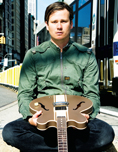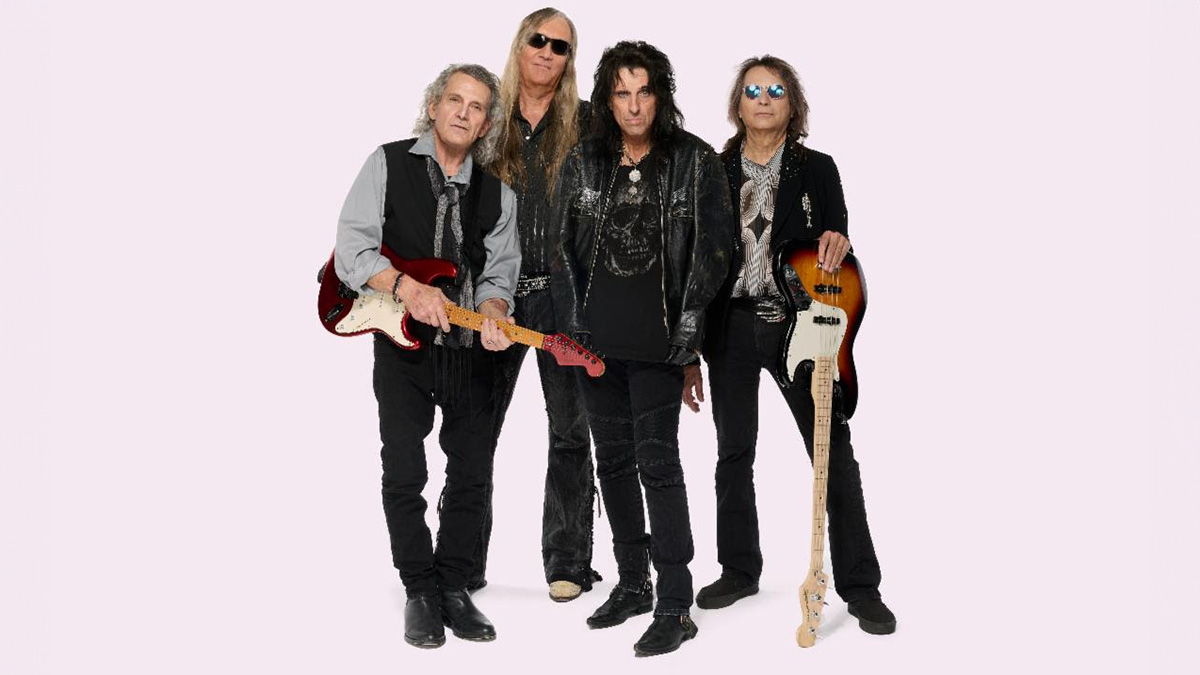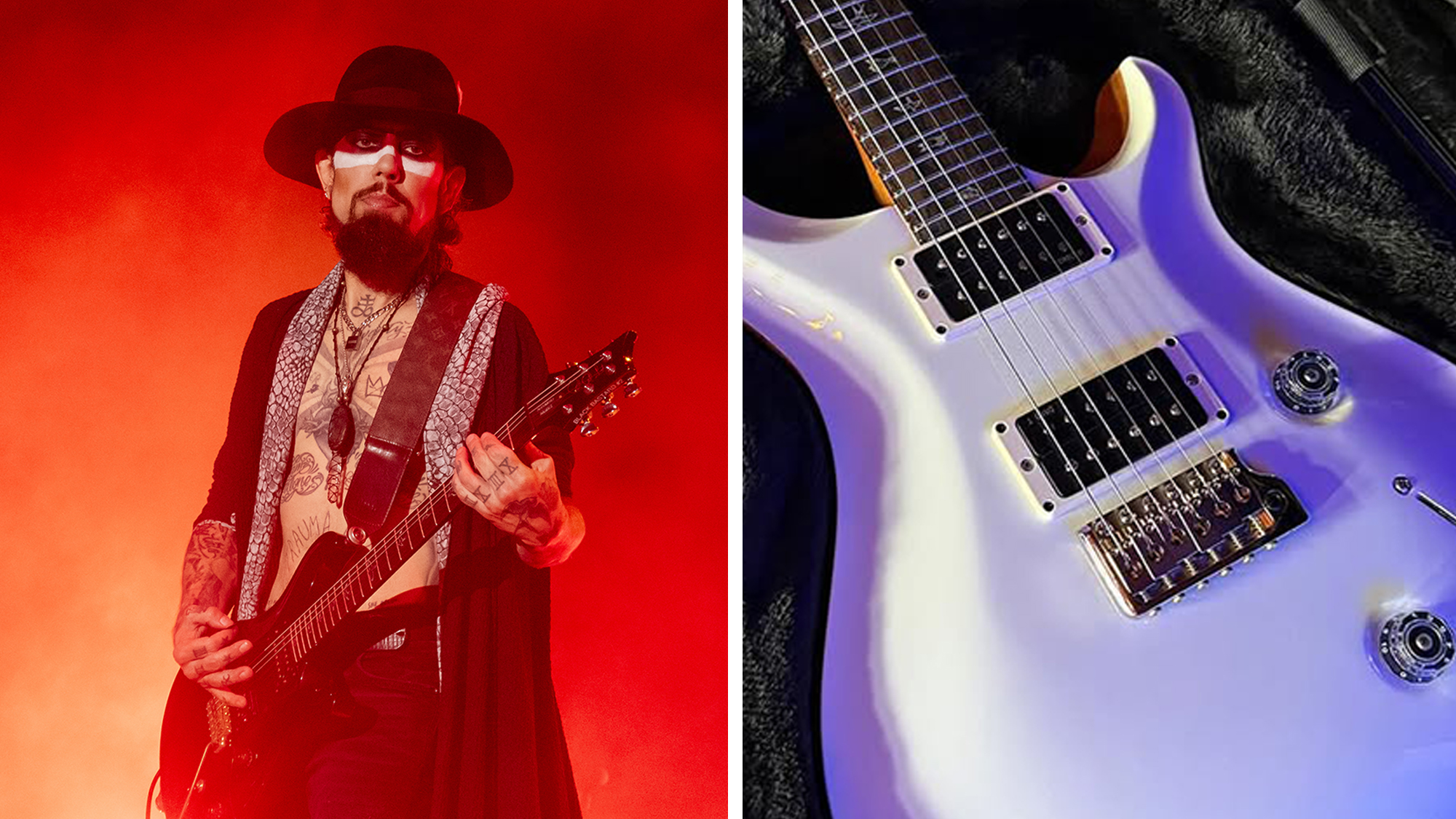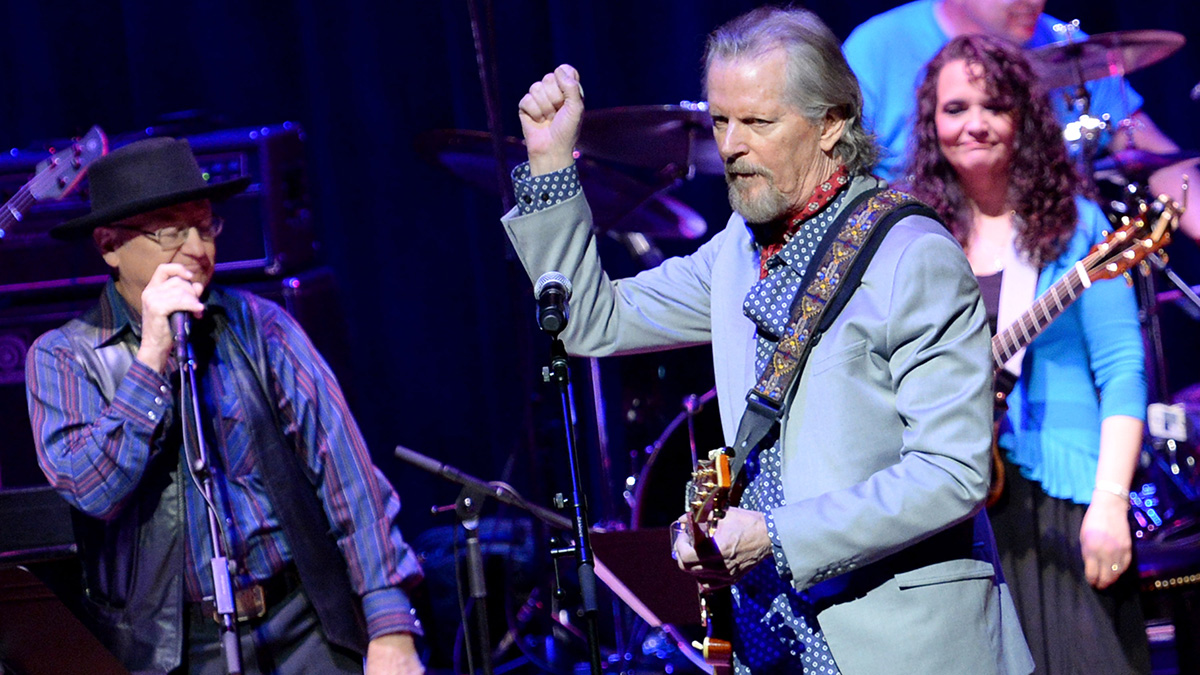Tom DeLonge interview: Empire State of Mind

Tom DeLonge embraces the realm of infinite possibilities and becomes master of his domain on Angels and Airwaves’ ambitious new album, I-Empire.
“I’m a pretty creative fellah,” says Angels and Airwaves leader Tom DeLonge. “I hope people keep underestimating me so I can continue to do some good shit.”
It’s a strange kind of boast, both confident and self-deprecating at the same time. Certainly, no one would underestimate DeLonge’s ability to write hit songs, at least not anyone who was around to witness the rise of DeLonge’s former band, Blink-182, to late-Nineties pop-punk supremacy and multi-Platinum status. But the Blink legacy carries with it an image of perpetual goofball adolescence. And DeLonge has been trying to shake that off ever since the 2005 launch of Airwaves and Angels’ debut album, We Don’t Need to Whisper.
Tom DeLonge MkII is a visionary, a wide-eyed idealist with a view of infinite human potential that embraces politics, spirituality, science and technology. The Airwaves and Angels sound is every bit as ambitious and epic, and that sound reaches its most expansive expression yet on the new A&A album, I-Empire (Geffen). It’s a dazzling digital edifice built of ringing, whooshing and whirling guitars manned by DeLonge and coguitarist David Kennedy, who soar above a massive, rock-solid foundation laid down by drummer Atom Willard and new bassist Matt Wachter.
“I definitely always have the whole sonic spectrum filled up,” DeLonge says. “We’ll record the rhythm guitars and I’ll say, ‘Something needs to happen on the high end.’ So we might put on a chiming guitar or a bell-like synth sound. We always try to make sure that every little pocket of the sonic spectrum is filled up with something. A lot of times it’s guitar, because I’m a guitar player.”
What hasn’t changed since the days of Blink is DeLonge’s winning way with pop choruses and hooks. I-Empire’s gloriously melodic, anthemic refrains are peppered with those plaintive catches that melt the hearts of punk rock girls while they appeal to the boys’ sensitive side. DeLonge’s panoramic aural and philosophical outlook is deftly encapsulated in I-Empire’s first single, the relentlessly upbeat “Everything’s Magic.” That song, and indeed all of I-Empire, was recorded in DeLonge’s hometown of San Diego, California.
“This time we moved into a rehearsal studio and made it into a recording studio,” he says. “It had 18-foot-high walls that we covered with images of starscapes and black holes. So this time it was like we actually were in space. We had an extremely galactic vibe.”
Get The Pick Newsletter
All the latest guitar news, interviews, lessons, reviews, deals and more, direct to your inbox!
So please join Guitar World now for a far-out journey to the center of Tom DeLonge’s mind.
GUITAR WORLD You’ve said that you see this new album as a continuation of the first one.
TOM DELONGE Definitely. When I created the band, we had all these high ideals and motivations for what we were doing. We felt that if we did something with a deep philosophical context to it, it would mean more to us and the listener. So it’s all about the idea that if you can see yourself infinitely, you can affect change in the world. The first album tried to communicate that. And this second album is about enacting that change and personifying that idea within your own life. That’s what the title I-Empire means. The cover artwork is a guy on a bike juxtaposed with this endless highway. He’s moving on this machine and he’s claiming the territory, the world, for his own. It’s his own personal empire that exists inside him and inside all of us.
GW What were your influences for the concepts behind these albums?
DELONGE I’m a political buff. I read a lot of books on policy. I also read a lot of New Age books and spiritualism: the workings of the universe, which it seems a lot of people are interested in these days. And I’m enamored of science fiction movies, like the old Stanley Kubrick film [2001: A Space Odyssey]. A movie just came out called Sunshine. It was directed by the same guy [Danny Boyle] who did Trainspotting, and it feels like what 2001 must have felt like when it first came out in 1968. Amazing movie. Basically, [Sunshine] says that space is truly infinite, so there’s infinite possibility. That’s what’s so cool about science fiction: you can create anything you want that’s happening out in the far reaches of space and it probably is happening somewhere, because space is infinite. Everything could be happening; everything is happening. That’s the beauty of understanding the physics of the universe. “Infinite” means there is no beginning and no end, and we know space is like that. So that means everything that is possible is happening right now. I really like those ideas. They keep me moving when things get tough.
GW Lyrically, the song “Secret Crowds” seems to be the centerpiece of the album—the song that lays out the big thematic issues.
DELONGE Absolutely. Thank you for saying that. Everyone should notice that early on. [quoting lyric:] “If I had my own world I would build you an empire.” That sums up the whole thing. The song is epic and aloft with romanticism at the same time. Because if you were to have your own world, you’d build much of it for someone you care about. So that song is a force to be reckoned with sonically: gigantic guitars, marching band snare drums and some beautiful melodies.
GW That is such a powerful idea: what we think of as reality is just a projection of our internal state of awareness, of consciousness, of mind.
DELONGE That’s totally it. And I think it’s the most uncool thing to sing about! But that’s what’s so punk about it. That’s what makes it so fucking cool. Because what punk band is going to come out singing about spirituality? Not many. You won’t make many friends. It’s like, “Whoa, dude, you got some balls.”
GW So if the two albums are linked, were any songs on the new album written back at the time of the first album?
DELONGE “Star of Bethlehem” and “True Love,” which are attached in this big, eight-minute, European kind of synthesized composition, were written last year, right after we finished the first record. But none of the other songs were. We might have had a chorus here or a riff there, but basically the entire album was written in the past six months.
GW Some of the songs sound like they’re based around percussion loops. Was that sometimes a starting point for you?
DELONGE Absolutely, yeah. That’s how we do things. We might put some rocks in a shoebox, shake them around and make a loop out of that. Or we’ll drop some chains on the floor or beat on the side of steel cans and create a rhythm out of that. Or we might do the same thing with a guitar or synthesizer. We just start with a noise, any kind of noise. But it never starts with jamming over a guitar riff. I ended that on the last record we did. This album was all about creating a loop or vibe that sent us off in one particular direction.
GW Were you working in Logic? Pro Tools?
DELONGE We have Pro Tools HD in the studio and we use Logic for live stuff. Pro Tools HD is the most fantastic tool in the world. I can’t believe all the bullshit I was handed so long ago that analog’s better. The digital world is such a beautiful world of possibility. There are so many options to experience or communicate your creative thought. You can dig into any tiny point of time and just work and work on it to make it unique.
GW Are you still doing a lot of guitar work yourself in the studio?
DELONGE That was largely so on the first record because it was put together with the band members coming in halfway through the process. But this record was super, super collaborative. I wrote the songs in the sense of writing the melodies and chord progressions: the major ingredients. But I definitely didn’t write the bass lines or drum parts or make all the arrangements myself. I am the producer in the sense that I’m the captain of the ship, but I can’t run the whole ship by myself.
GW What were your main guitars and amps for this project?
DELONGE You know, I have all these guitars and amps that I’ve bought. But it always comes down to the one guitar I have from Gibson, my signature model ES-333. And I use a Vox AC30 and Fender Twin in stereo; I’ve tried other things but I always end up with those two. There’s no better sound, I guess—although I do have a 1x12 Orange combo amp. I don’t know the model but it’s fucking awesome. It’s like their version of the AC30. I’ve used that a few times, too.
GW Some of the guitar tracks sound like they were processed through a synth filter envelope device. I hear something like that on the intro to “Rite of Spring,” for example.
DELONGE We probably used the Electro-Harmonix Micro Synth guitar pedal on that part. We used a lot of pedals, including a lot of MXR phasers and flangers. The delay of choice on everything is the Boss DD-6 Digital Delay, and we usually compress everything through a Line 6 Constrictor. So we absolutely use pedals everywhere. We shape the pockets with those. You get a good guitar tone, but then you throw a pedal on there to fit it into the frequencies of the song—to make it speak in the track. We sculpt sounds like crazy.
GW The flanging is nice on “Love Like Rockets.”
DELONGE I tried everything in the world to find a good flanger. I was convinced there was no good flanger. If I turn on a flanger, I wanna fucking hear it. I don’t want to hear it just kind of changing around in the background; I want to hear it really sweeping through the sound, like on an old Cure record. And finally I found the pedal that does it: the MXR EVH Eddie Van Halen flanger, which is fucking awesome. We got that halfway through the recording. So now I’ve got my flange in my toolbox.
GW There’s something very “science fiction” about flanging.
DELONGE Yeah, which is especially good for Angels and Airwaves. Everything we do is science fiction. On “Love Like Rockets,” the song you just mentioned, there are astronauts talking and [former U.S. president] Eisenhower making a speech about peace on earth. That whole song compares the first launch of the Apollo to the first kiss of a girl. It’s got this really epic, sweeping flange going around. It should feel like you’re going on the Disneyland Space Mountain ride.
GW I was wondering what those spoken-word samples were in the beginning.
DELONGE It was Eisenhower making the first speech transmitted from space, bouncing off the first [communications] satellite. He said, “Through the marvels of scientific advance, my voice is coming to you via a satellite circling in outer space. I’m bringing you America’s wish for peace on earth.”
GW Good old Ike.
DELONGE I know. Good old Ike. Whatever happened to those days?
GW What kind of guitar stuff was David playing on the record?
DELONGE The same gear as me. We use the same set of tools. I think the days of having so much gear and being a fucking gearhead is grandpa’s way. We don’t want to run too many things through the signal path. We want a clean signal that’s reliable and consistent. Even live, it’s one TC Electronic unit that compresses, delays and flanges. We also run Palmer Speaker Simulators that enable us to use the P.A. speakers as our guitar speaker cabinets. You see guitar cabinets onstage, but we’re plugging from the [guitar] power amps straight into the P.A. And as soon as you do that, you instantly get 6dB louder and you can hear all the flanging and stereo delay echoing left and right in the P.A. So we’re very much into using as few tools as we can but having the right ones.
GW It seems like you got more heavily into keyboards on I-Empire, too.
DELONGE Definitely. I’m a huge fan of the Roland Fantom [workstation keyboard], and we also have a new Yamaha synth that’s pretty awesome. As soon as you add a synth pad to something, it feels like the song is lifting off the ground.
GW Does Roger Manning [keyboardist with Moog Cookbook, Jellyfish and Imperial Drag] play on I-Empire, as he has on your prior discs?
DELONGE Yeah, he played on just about every song. I do my keyboard thing with two fingers, then he comes in and plays with all 10 fingers and it sounds better.
GW So Matt Wachter has come on as Angels and Airwaves’ new bass player and Ryan Sinn is out?
DELONGE That’s right. Ryan was an amazing dude and bass player but he was more of a goth-punk kid. We’re more pop-punk/modern rock kids. And Matt grew up with the same punk rock bands we did, in the exact same area of town, so it made all the sense in the world. Plus, he came from 30 Seconds to Mars, a great band that understands cinema. That’s where we’re at, too. Matt came in about a third of the way through making the album, and it put my band into overdrive. For one, the guy is a classically trained pianist. His bass parts are flawless because his timing is so impeccable. Plus, he’s a graphic artist and edits all of our short films. So he’s way beyond anything I could have hoped for.
GW Had you begun tracking with Ryan?
DELONGE No. At the point Ryan was in, we were still getting the foundations for the songs. So he didn’t do any tracking.
GW Speaking of growing up with punk rock, is “Rite of Spring” an autobiographical song?
DELONGE Completely. The inspiration came from watching a U2 video called “Sometimes You Can’t Make It On Your Own.” Bono wrote this song about his father passing away. In the video he’s walking around his old town in Ireland and he goes to the house where he grew up. He’s laying on a bed in the bedroom where he grew up. He went there, knocked on the people’s door and said, “Hello, I grew up here. I’m Bono. I’m doing a music video.” How more honest can you be? To tell the truth, my song isn’t as good as his. But sonically I laid a foundation that I thought would sound like old New Order or Joy Division and wrote a really honest take on growing up, trying to make it with a guitar and a skateboard and getting kicked out of high school. What I do know is that 90 percent of the suburbanites who hear this will relate to it, because it’s a very normal story these days.
GW You really do seem to be channeling Bono a lot on this album.
DELONGE Yeah, I got a little bit of that “yo-oh-oh” vocal move going.
GW I counted it on at least three songs: “True Love,” “Lifeline” and “Rite of Spring.” And you’ve got the “Sunday Bloody Sunday” military snare drum paradiddles in “True Love,” not to mention all the chiming, Edge-influenced guitar work.
DELONGE I know. I’m guilty! What do you want me to say, man? It would be less honest for me not to acknowledge my influences, to try and hide them. But you know who my favorite frontman in the world is? David Gahan from Depeche Mode. But my favorite singer/songwriter kind of guy is definitely Bono. My coolest one is maybe Sting. I like them all for different reasons. But U2 to me are the Beatles for this generation: they have as many hits as the Beatles did, and they were just as super adventurous, but with modern technology. I’m really inspired by them as far as having a modern band approach to songwriting and stylistic diversity. The Cure were pretty essential, too, but they were more one specific kind of sound, as were Depeche Mode and the Police. But U2 have songs that are like the Cure, the Police, Frank Sinatra and Johnny Cash. And that’s how I approach it. Our next record will have stuff like the Beatles on it. I’m pushing Angels and Airwaves to be as ambitious as they can.
GW Were you pleased with the reception the first Angels and Airwaves album received?
DELONGE Oh yeah. I had more critical acclaim on that than anything I’d ever done. People in the rock world grow up with different influences. There are classic rock people, metalheads and punkers. But I’m a modern rock kid. I grew up with punk rock, new wave and mod kind of music. My point is that Angels and Airwaves very much sums up a modern rock view of music over the past 34 years. You’ll hear punk rock bands like the Descendents, NOFX and Bad Religion in there, but also Peter Gabriel, the Cure, the Who, New Order… It’s all in there. If you grew up listening to your modern rock station in town, you’ll probably love Angels and Airwaves. We’re bringing all those sounds into one modern package for the new kid.
GW In the past you’ve been politically engaged, another thing you share with Bono. You’ve worked for John Kerry and done things to promote alternative energy. Are you doing anything like that currently?
DELONGE Yes. I’m in the middle of launching a giant rock tour next year that will involved Angels and Airwaves with the top 25 technology companies in the world. It will basically show all of the modern world under one roof, and it will demonstrate that the future is now, and that it can be whatever you want to make it. That whole tour is going to be launched symbiotically, with a technology that should help out the music industry in an amazing way, giving bands the ability to create their own economy without the use of record labels, television and all those kind of things that can’t help us as much as they used to.
GW Can you go into more detail?
DELONGE Not now. I have no fucking clue if I can pull off this off, but I’m working on it.
GW In terms of public perception, do you think you’ve been able to put Blink-182 behind you?
DELONGE I think so. I know a lot of kids are still pissed that the group is finished. But I think that, for the most part, critics and the like are pretty excited. I’m confident that this band is good. I know what I put into both bands, and I’m really excited about proving my point. There’s so much art and passion in this. And I know it’s the best songwriting I’ve ever done.
“I knew the spirit of the Alice Cooper group was back – what we were making was very much an album that could’ve been in the '70s”: Original Alice Cooper lineup reunites after more than 50 years – and announces brand-new album
“Such a rare piece”: Dave Navarro has chosen the guitar he’s using to record his first post-Jane’s Addiction material – and it’s a historic build










